PALOP
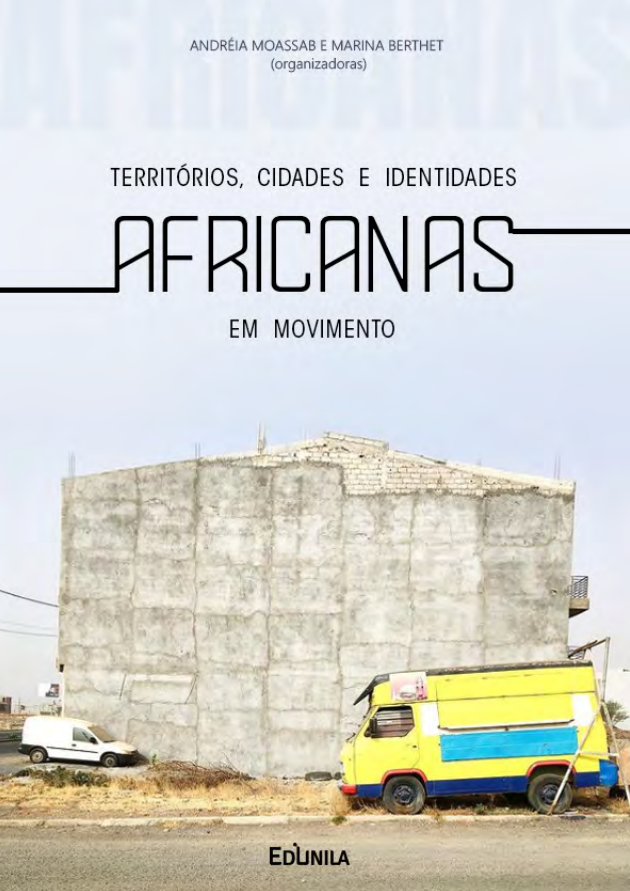
Hip-hop em Cabo Verde: rap e representação do espaço público na cidade da Praia
Abstract:
In Hip-hop em Cabo Verde: rap e representação do espaço público na cidade da Praia, the author studies how, despite the strong link with Portugal and the existence in that country of numerous rap groups composed of Cape Verdeans or descendants of Cape Verdeans, the hip-hop produced there is practically ignored and very little consumed by young people, particularly those from the periphery, to the detriment of the culture of North American black ghettos, known through the audiovisual flows of the digital era. Young people all over the world are seen as a risk factor, an association that is particularly patent in the modern discourse on security, especially in an era in which a part of young people associate themselves with street gangs, revealing “the failure of the expected reproduction of the support mechanisms of an expansive and optimistic capitalism”, which provides the so-called “Welfare State”. Thus, in the face of a feeling of juvenile unease, evidenced in some actions that destabilize the social order and the “Creole morabeza”, it becomes mandatory that the institutions that protect this population layer control them, reprogramming them institutionally, thus building a State Social Service.
Quotation:
Lima, R.W. (2022). Hip-hop em Cabo Verde: rap e representação do espaço público na cidade da Praia: In Territórios, cidades e identidades africanas em movimento. Andréia Moassab, Marina Berthet (Orgs.), 119-133. Foz do Iguaçu: EDUNILA, 2022. ISBN: 978-65-86342-32-1
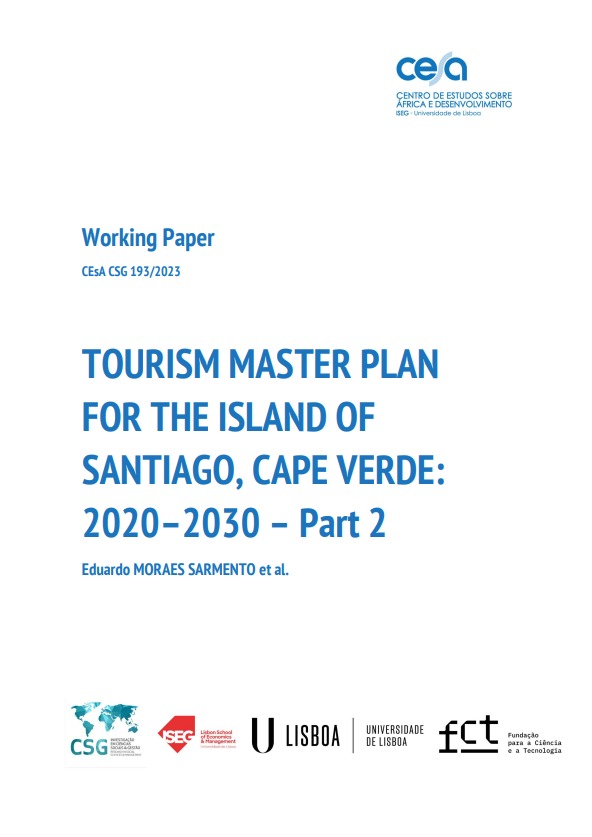
Working Paper 193/2023: Tourism Master Plan for the Island of Santiago, Cape Verde: 2020-2030 – Part 2
Abstract:
Cape Verde, a small insular development economy (SIDS), has been confronted and faces various economic, social and environmental constraints throughout its history that have been conditioning its growth strategy. In recent years, tourism has been growing and consolidating an important contribution to economic development, which is observable in the evolution of the number of nights spent in the country, revenue, number of guests, employment generation, and incentive to exports, among others. The gross added value of tourism currently has a weight that is already more than 20% of its GDP (excluding the COVID-19 pandemic period). Aware of this potential, the government created conditions for a greater use of its effects as a mobilizing factor in the economy, as reflected in various official supporting documents and strategic orientations, such as the Strategic Plan for Sustainable Development, and the Main Options of the Strategic Plan for Sustainable Development for the Tourism Activity. The Government decided that each island or region should develop its own strategic tourism plan (Masterplan). Tourism Master Plan For The Island Of Santiago, Cape Verde : 2020–2030 – Part 2 proposes several main strategic reflections about the Tourism Master Plan for the Island of Santiago in order to improve its competitiveness.
Quotation:
Sarmento, E. M. et al. (2023). “Tourism Master Plan For The Island Of Santiago, Cape Verde : 2020–2030 – Part 2”. Instituto Superior de Economia e Gestão – CEsA/CSG – Documentos de Trabalho nº 193/2023
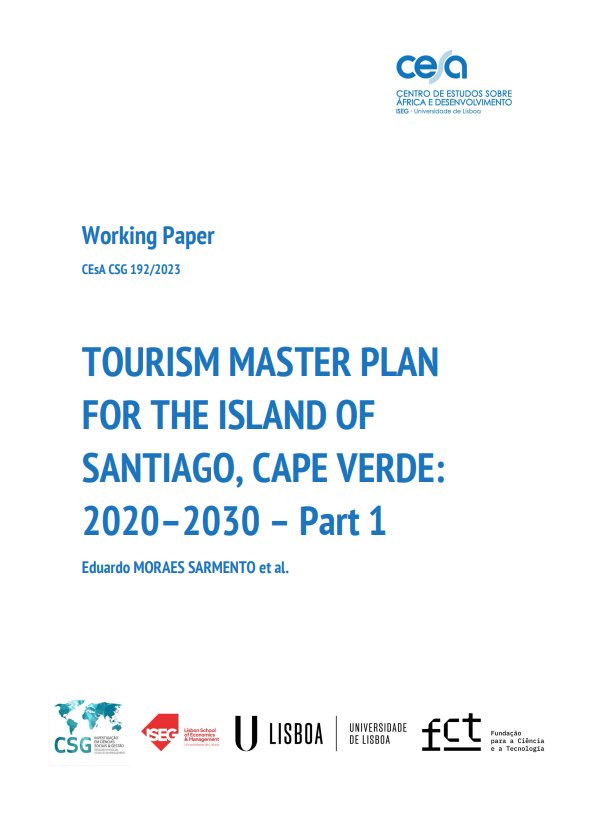
Working Paper 192/2023: Tourism Master Plan for the Island of Santiago, Cape Verde: 2020-2030 – Part 1
Abstract:
Cape Verde, a small insular development economy (SIDS), has been confronted and faces various economic, social and environmental constraints throughout its history that have been conditioning its growth strategy. In recent years, tourism has been growing and consolidating an important contribution to economic development, which is observable in the evolution of the number of nights spent in the country, revenue, number of guests, employment generation, and incentive to export among others. The gross added value of tourism currently has a weight that is already more than 20% of its GDP (excluding the COVID-19 pandemic period). Aware of this potential, the Government created conditions for a greater use of its effects as a mobilizing factor in the economy. Accordingly, various official supporting documents and strategic orientations have been approved, such as the Strategic Plan for Sustainable Development and the Main Options of the Strategic Plan for Sustainable Development for the Tourism Activity. It was also decided that each island or region should develop its own strategic tourism plan (Masterplan). Tourism Master Plan For The Island Of Santiago, Cape Verde: 2020–2030 – Part 1 integrates the main strategic reflections regarding the Tourism Master Plan for the Island of Santiago. Revenue from tourism on the Island of Santiago, where the capital of Cape Verde is located, has been much less than the values of the main islands with a high volume of tourists – Sal and Boa Vista. However, the potential of Santiago is high, and therefore it is necessary to adopt the correct measures required to transform this potential into reality. Therefore, this paper presents a short, medium and long-term vision, with a proposal for strategic objectives that will constitute the anchor on which all operational strategic and objectives that will translate into specific lines of action will be based. In summary, this document proposes a strategy based on a diversified and differentiated touristic offer from the other islands of the country, which maximises its potential, counteracting regional asymmetries and preserving the historical and intangible heritage, as well as the natural resources, with the aim for the whole population to benefit from the resultant economic development, especially the most disadvantaged.
Quotation:
Sarmento, E. M. et al. (2023). “Tourism Master Plan For The Island Of Santiago, Cape Verde: 2020–2030 – Part 1”. Instituto Superior de Economia e Gestão – CEsA/CSG – Documentos de Trabalho nº 192/2023
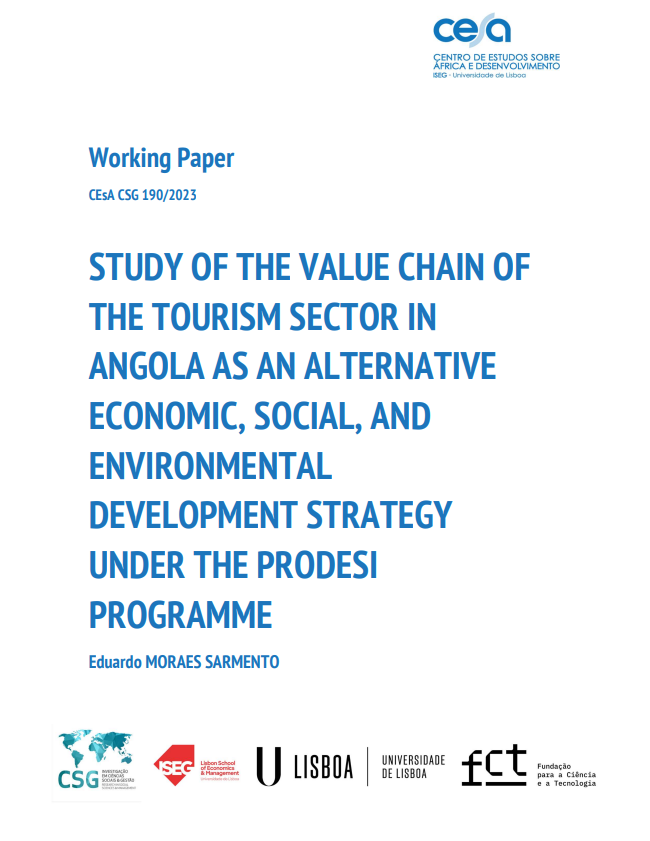
Working Paper 190/2023: Study of the value chain of the tourism sector in Angola as an alternative economic, social, and environmental development strategy under the Prodesi programme
Abstract:
Angola has been facing several economic and social problems, with one of the most important being related to the country’s long tradition of dependency on oil as a major external revenue. Due to this situation, the country’s income has been slowing and there is a need to find alternative strategies to increase the liquidity of the economy without which Angola would lack the necessary funds to increase investment and proceed with adequate policies to combat social exclusion and eradicate the flows of poverty. Aware of this situation, the government implemented the national PRODESI project, whose aim is to accelerate the process of the diversification of the nation’s economy. To this end, the project aims to promote production and exports in the non-oil sectors, as well as in sectors with a strong potential for import substitution. One of these areas is tourism, as a means of developing some of the country’s regions and provinces, and also in order to benefit populations living in worse conditions, whilst diversifying the economic restrictions. The focus of actions in PRODESI foresees that the to accelerate the diversification of the economy, whether through import substitution or through diversification and an increase in exports, will be directed towards the production of goods and services or the implementation of new strategies designed to gain critical mass and create intra and intersectoral relationships, such as in the case of tourism. Accordingly, the purpose of this research is to identify the main weaknesses of the core value chain of tourism and to propose a set of measures and recommendations to be implemented within the scope of PRODESI. The main objective is to ensure that this activity effectively contributes to diversifying Angola’s economy in a sustainable path and that it helps leverage the increase in national production in a faster and more efficient way and thus significantly help decrease the dependency on imports and increase the export basis, which can be achieved through adopting a strategy of diversification, based on both international and national tourism. 3 Methodologically, several studies were consulted and various meetings and in-depth field visits were made, between January and March 2000, in the provinces of Luanda, Malange, Huíla, and Namibe. Several interviews were carried out up until 2021with major players (ranging from ministers through to national directors and other experts) and tourist organizations (Ministries, Travel Agencies, and entrepreneurs). It is estimated that in the next 10 years Sub-Saharan Africa will register a growth in tourism superior to the global average, regardless of the COVID pandemic. Study of the Value Chain of the Tourism Sector in Angola as an Alternative Economic, Social, and Environmental Development Strategy Under the Prodesi Programme concluded that even though tourism in Angola still faces a deficit at several levels, the country nevertheless has a set of natural resources and tourism attributes that, if properly explored and used, could provide an alternative way for the future development of Angola’s society. Angola still faces residual tourism receipts from tourism activity as well as in total international incoming tourists, and therefore Angola’s national government may have a huge opportunity to implement a suitable tourism strategy (both for internal and external flows), in order to not only reinforce its importance but also to benefit the population, fight poverty, and diversify economic activities, as defined in the PRODESI strategy.
Quotation:
Sarmento, E.M. 2023. “Study of the Value Chain of the Tourism Sector in Angola as an Alternative Economic, Social, and Environmental Development Strategy Under the Prodesi Programme“. Instituto Superior de Economia e Gestão – CEsA/CSG – Documentos de Trabalho nº 190/2023
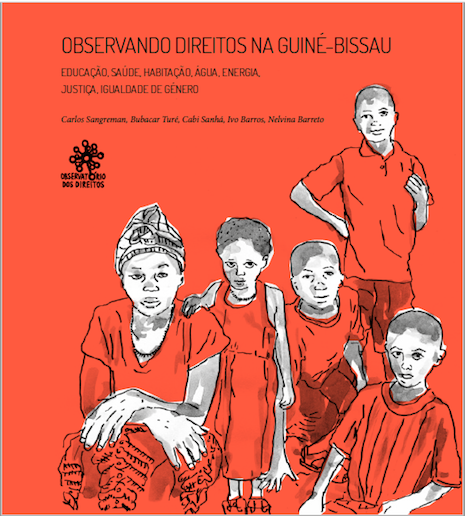
Observando direitos na Guiné-Bissau: educação, saúde, habitação, água, energia, justiça, igualdade de género
The Rights Observatory integrated in a structure such as Casa dos Direitos is an example of what civil society can do in fragile social contexts, but where power respects the Right to Opinion (even if at some times there is repression of media outlets such as radios and television and a climate of threat to critics of the situation at the time). The data collected on access to Economic and Social Human Rights, disseminated through books and exhibitions, in order to be used by activists and responsible authorities, has even been the basis for academic research at undergraduate, master’s and, this year, doctoral levels, especially in Portugal and Brazil.
Abstract:
The objective of Observando direitos na Guiné-Bissau: educação, saúde, habitação, água, energia, justiça, igualdade de género and the Observatório dos Direitos in 2019 was to continue the collection of data on access to Economic and Social Human Rights in Guinea-Bissau with data comparable to those of 2016, and to include two innovations: a new chapter on Women’s Rights or Equality of Gender and perform data collection also in the Bolama/ Bijagós region.
Quotation:
Sangreman, Carlos [et al.] (2020). Observando direitos na Guiné-Bissau : educação, saúde, habitação, água, energia, justiça, igualdade de género. Lisboa: ACEP, com LGDH e CEsA. URL: https://www.repository.utl.pt/handle/10400.5/20866
Access the article here.
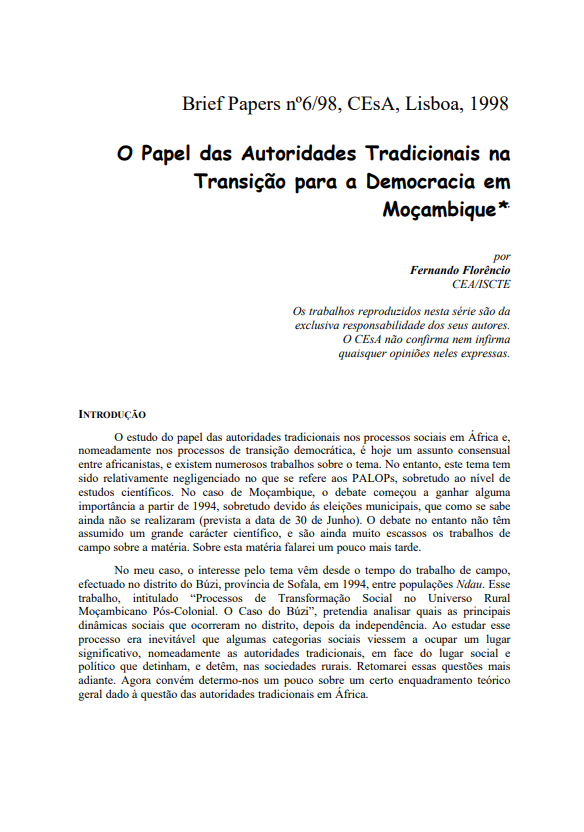
Brief Paper 6/1998: O Papel das Autoridades Tradicionais na Transição para a Democracia em Moçambique
Abstract:
The study of the role of traditional authorities in social processes in Africa, namely in the processes of democratic transition, is today a consensual issue among Africanists, and there are numerous works on the subject. However, this theme has been relatively neglected in what concerns the PALOPs, especially at the level of scientific studies. In the case of Mozambique, the debate started to gain some importance as from 1994, mainly due to the municipal elections, which as we know have not yet taken place (scheduled for 30 June). However, the debate has not taken on a scientific character, and fieldwork on the subject is still very scarce. I will talk about this subject a little later. In my case, the interest in the theme comes from the time of fieldwork, carried out in Búzi District, Sofala Province, in 1994, among Ndau populations. This work, entitled “Processes of Social Transformation in the Rural Universe of Post-Colonial Mozambique. The Case of Búzi”, intended to analyse the main social dynamics that occurred in the district after independence. In studying this process it was inevitable that some social categories would come to occupy a significant place, namely the traditional authorities, in view of the social and political place they held, and hold, in rural societies. I will return to these issues later. It is now convenient to dwell for a moment on a certain general theoretical framework given to the question of traditional authorities in Africa. Communication presented at the CESA 1998 Seminar: A Problemática do Desenvolvimento – Historicidade e Contributos Actuais numa Óptica Transdiciplinar (The Problem of Development – History and Current Contributions from a Transdisciplinary Perspective), Conference O Papel das Autoridades Tradicionais na Transição para a Democracia em Moçambique (The Role of Traditional Authorities in the Transition to Democracy in Mozambique), 14th May 1998.
Quotation:
Florêncio, Fernando. 1998. “O papel das autoridades tradicionais na transição para a democracia em Moçambique”. Instituto Superior de Economia e Gestão – CEsA Brief papers nº 6-1998.
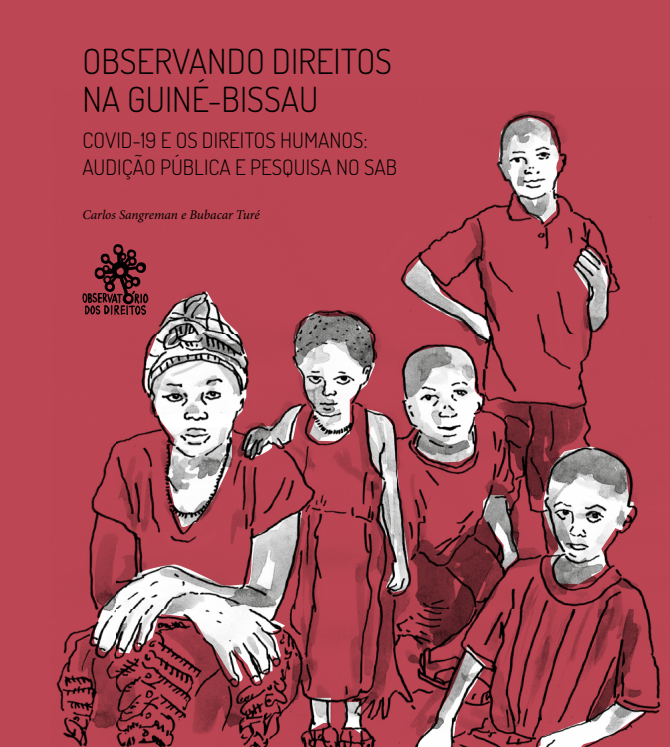
Observando direitos na Guiné-Bissau: Covid-19 e os direitos humanos: audição pública e pesquisa no SAB
Abstract:
Observando Direitos na Guiné-Bissau – Covid-19 e os Direitos Humanos: audição pública e pesquisa no SAB intends to investigate the human rights situation during the Covid-19 pandemic in Guiné-Bissau between January 2020 and January 2022. The framework is based on documentary research on human rights in sub-Saharan Africa from the production of international and specialized organizations, and other non-governmental human rights defenders of the same period. For Guiné-Bissau, in addition to equal research, the communiqués and official bulletins of the “Hight commissariat for Covid-19” were also collected with the information of infected, hospitalized, recovered, deaths and vaccinations, as well as interviews with the newspapers of the Commissioner and the Secretary. With the concentration of cases in the capital, Bissau, the research organize a survey of families, of market sellers and of companies on the effects of the pandemic and the measures enacted by the Government/Presidency to contain. A public hearing was also organized in the House of Rights, with various entities ranging from the High Commissariat to Unions, journalists, and public order police to information about how each institution through its situation and action in this period. As conclusions of the analyses of all these qualitative and quantitative data, it is possible to affirm that Guinea-Bissau’s fragility has such a weight in Guinean society that a disease that has killed fewer people in the country than malaria, diarrhea or tuberculosis has not overlapped with problems arising in poverty and low incomes in general. It affected Human Rights by showing that it was already knew about the enormous shortcomings of the health system, but the effects were more graves on economic and social rights by the abrupt stagnation of economic international activity, the cooperation project, unemployment, and the rise of poverty than directly by the pandemic and measures adopted. The human rights of first generation, more political, freedom of the press and demonstration were affected, with arbitrary arrests and violence practiced by unidentified individuals intensifying the climate of impunity and feeling that the regime is becoming increasingly repressive, but it cannot be said that they were effects directly arising from the pandemic.
Quotation:
Sangreman, C., Turé, B. (2022). Observando Direitos na Guiné-Bissau – Covid-19 e os Direitos Humanos: audição pública e pesquisa no SAB. pag.93. Lisboa: ACEP, com LGDH e CEsA. ISBN 978-9898625-27-4





